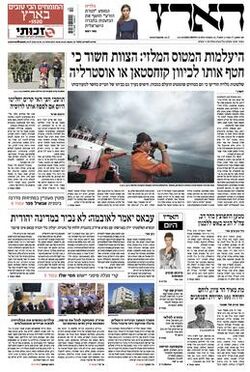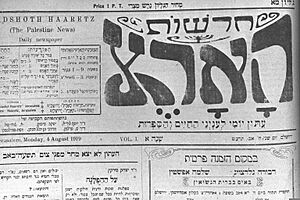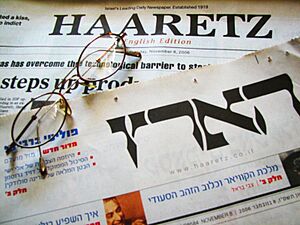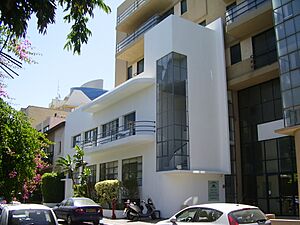Haaretz facts for kids
 |
|
| Type | Daily newspaper |
|---|---|
| Format | Berliner |
| Owner(s) | Schocken family (75%) Leonid Nevzlin (25%) |
| Publisher | Amos Schocken |
| Founded | 1919 |
| Political alignment | Centre-left to left-wing Liberalism Progressivism |
| Language | Hebrew, English |
| Headquarters | Global HQ: Tel Aviv, Israel North American HQ: New York City |
| Circulation | 72,000 (weekends: 100,000) |
Haaretz (which means "The Land [of Israel]" in Hebrew) is a daily newspaper from Israel. It started in 1918, making it the oldest newspaper still printed in Israel today. The paper is published in both Hebrew and English. You can read it in print or online. In North America, it comes out once a week. Haaretz is known for its left-leaning and liberal views on issues in Israel and around the world.
As of 2022, Haaretz was the third most widely read newspaper in Israel. People around the world, especially those who read its English version, often read and discuss its articles. Many consider Haaretz to be very important and respected for its news and opinions.
Contents
The Story of Haaretz
Early Days and Ownership Changes
Haaretz first began in 1918. It was supported by the British military government in Palestine at that time. In 1919, a group of people who supported Zionism (a movement for a Jewish homeland) took over the newspaper. It was first called Hadashot Ha'aretz, meaning "News of the Land." Later, its name was shortened to Haaretz. Many famous Hebrew writers contributed to its literary section.
The newspaper was first published in Jerusalem. It moved to Tel Aviv in 1923. For many years, Haaretz had a liberal viewpoint. It was seen as a very smart and important newspaper in the Jewish community in Palestine.
The Schocken Family's Role
Salman Schocken, a Jewish businessman, bought the newspaper in 1935. His son, Gershom Schocken, became the main editor in 1939. He led the newspaper for a very long time, until 1990. The Schocken family owned Haaretz completely until 2006.
In 2006, they sold a part of the newspaper (25%) to a German publisher. Later, in 2011, a Russian-Israeli businessman named Leonid Nevzlin bought a 20% share. By 2019, the Schocken family bought back the shares from the German publisher. This meant the Schocken family owned 75% of Haaretz, and Leonid Nevzlin owned the remaining 25%.
Challenges and Government Actions
In October 2012, workers at Haaretz went on strike. They were protesting against plans to reduce staff. This caused the newspaper to not be printed for one day. It was the first time this had happened since 1965.
In November 2024, the Israeli government decided that its officials and government-funded groups should not work with Haaretz. They also stopped advertising in the newspaper. This happened because Haaretz had published articles about actions by government officials and the military.
Who Leads Haaretz?
The newspaper's main direction was set by Gershom Schocken for many years. Since 2011, Aluf Benn has been the editor-in-chief. Other important people, like Charlotte Halle, edit the English print edition. Many talented journalists and writers have worked for Haaretz over the years.
What Haaretz Believes In
Haaretz describes itself as having a "liberal outlook." This means it generally supports ideas like civil rights and a fair economy. It often supports the Supreme Court and is critical of some government actions. Many people describe it as a liberal or centre-left newspaper. It is known for being the only major left-leaning newspaper in Israel.
The paper does not support Israel keeping control over the Palestinian territories. It consistently supports efforts for peace. Haaretz also supports groups in Israeli society that might be weaker. This includes foreign workers, Israeli Arabs, and immigrants.
Some people have described Haaretz as "the most liberal newspaper in Israel." Its opinion pages are open to different viewpoints. It is also known for being very critical of Israeli settlements.
How Haaretz Looks and Is Read
Newspaper Readership
In 2022, a survey showed that Haaretz was the third most-read newspaper in Israel. It had about 4.7% of the readership. Other newspapers like Israel Hayom and Yedioth Ahronoth had more readers.
Newspaper Design and Content
Haaretz uses smaller headlines and print compared to other large newspapers in Israel. It uses fewer pictures and focuses more on political analysis. The opinion articles are usually written by regular writers. Its editorial pages are very important among government leaders. Besides news, Haaretz publishes articles on social and environmental topics. It also has book reviews, investigative reports, and political comments.
In 2008, the newspaper reported that it had 65,000 paying subscribers. It sold about 72,000 copies daily and 100,000 on weekends. The English edition had 15,000 subscribers.
Who Reads Haaretz?
Even though it has fewer readers than some other papers, Haaretz has been called Israel's most important daily newspaper for many years. Its readers include educated people and those in important political and business positions. Surveys in 1999 showed that Haaretz readers usually had higher education, income, and wealth. Some people say that Haaretz is like The New York Times in the United States. It is seen as a newspaper that records important events.
Some people have criticized Haaretz for its reporting. For example, in October 2024, the publisher of Haaretz, Amos Schocken, made comments that caused a strong reaction. He criticized the government, and several government ministries then stopped their subscriptions to the newspaper.
Online Editions
Haaretz has websites in both Hebrew and English. These websites provide breaking news, live question-and-answer sessions with important people, and blogs with different opinions.
Haaretz Offices
The main Haaretz building is located on Schocken Street in south Tel Aviv. The old Haaretz building, used from 1932 to 1973, was partly saved. Its front part was included in a new building.
Journalists and Writers
Current Writers
- Ruth Almog – literature
- Merav Arlosoroff – economy
- Avraham Balaban – Tel Aviv history
- Zvi Barel – Middle East
- Omer Benjakob - technology
- Aluf Benn – editor-in-chief
- Bradley Burston – politics
- Saggi Cohen – food
- Lily Galili
- Doram Gaunt – food
- Avirama Golan
- Ehud Barak
- Ehud Olmert
- Zehava Galon
- Amos Harel – military
- Israel Harel – columnist
- Danna Harman – feature writer
- Amira Hass – Palestinian affairs
- Avi Issacharoff – military
- Uri Klein – film critic
- Yitzhak Laor – publicist
- Alex Levac – photo
- Gideon Levy – Palestinian affairs
- Amir Mandel – music critic
- Amir Oren – military affairs
- Sammy Peretz – economic affairs
- Anshel Pfeffer – politics
- Tsafrir Rinat – environment
- Guy Rolnick – economic affairs
- Doron Rosenblum – satirist
- Ruth Schuster – archaeology, science
- Tom Segev – historian
- Ben Shalev – music critic
- Nehemia Shtrasler – economic affairs
- Simon Spungin – English Edition
- Gadi Taub – politics
- Amir Tibon
- Yossi Verter – politics
- Esther Zandberg – architecture
- Benny Ziffer – literature
Past Writers
- Nathan Alterman (1910–1970)
- Moshe Arens – columnist
- Ehud Asheri
- Gidi Avivi – music critic
- Meron Benvenisti (1934–2020) – politics
- Noam Ben Ze'ev – music critic
- Yoram Bronowski (1948–2001) – literary critic
- Arie Caspi
- Daniel Dagan
- Akiva Eldar – diplomacy
- Amos Elon (1926–2009) – correspondent
- Boaz Evron
- Michael Handelzalts – theater critic
- Sayed Kashua – satiric columnist
- Jerrold Kessel
- Yair Kotler
- Tami Litani
- Aviva Lori
- Yoel Marcus – politics
- Yossi Melman – intelligence
- Natasha Mozgovaya – U.S. correspondent
- Ran Reznick – health
- Daniel Rogov – food and wine
- Danny Rubinstein – Arab affairs
- Gideon Samet – politics
- Yossi Sarid (1940–2015) – politician
- Ze'ev Schiff – military
- Daniel Ben Simon
- Ruth Sinai – social welfare
- Ze'ev Segal – law
- Ari Shavit – politics
- Yair Sheleg – Jewish religious affairs
- Nadav Shragai
- Ze'ev Sternhell – politics
- Benjamin Tammuz (1919–1989) - literary critic
- Pavel Wolberg – photographer
- Merav Michaeli
See also
 In Spanish: Haaretz para niños
In Spanish: Haaretz para niños
- Culture of Israel
- Economy of Israel
- List of newspapers in Israel
 | Calvin Brent |
 | Walter T. Bailey |
 | Martha Cassell Thompson |
 | Alberta Jeannette Cassell |





